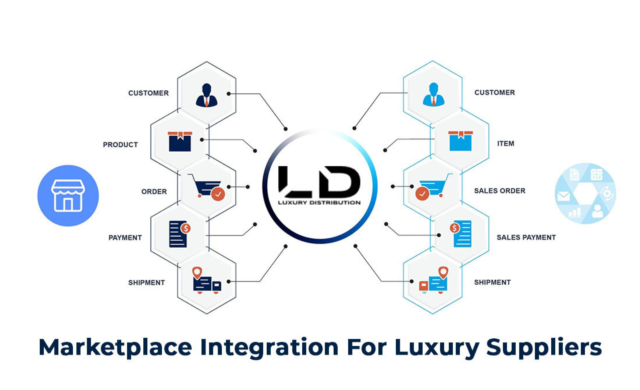
blog address: https://luxury-distribution.com/
blog details: In today’s digital-first world, luxury brands and suppliers find themselves needing to expand beyond traditional retail channels to remain competitive and capture the attention of modern, discerning consumers. Marketplace integration offers an ideal solution for luxury suppliers to access an expanded audience, optimize sales, and establish a streamlined, cohesive presence across multiple platforms. This blog explores the key benefits of marketplace integration for luxury suppliers and how they can maximize this approach to drive growth and brand reputation in the B2B sector.
Expanding Reach While Maintaining Brand Exclusivity
One of the most compelling benefits of marketplace integration is the potential to reach a broader yet targeted audience. Luxury suppliers traditionally operated within niche markets, often relying on exclusive in-store experiences or boutique online platforms. Marketplace integration for luxury suppliers can help them expand their audience beyond existing loyal customers while still maintaining control over brand presentation and exclusivity.
Streamlining Operations for Efficiency and Accuracy
Marketplace integration streamlines business operations for luxury suppliers, allowing them to manage listings, inventory, and order processing all in one centralized location. This integration reduces the manual effort and errors associated with managing multiple sales channels independently. Additionally, with inventory syncing capabilities, luxury suppliers can avoid issues like overselling or underselling by providing real-time stock information across platforms.
Enhancing Data Insights and Analytics
Data is a crucial asset for luxury suppliers, and marketplace integration provides comprehensive analytics that can help suppliers optimize their strategies and maximize profitability. Integrated platforms gather insights on customer behaviors, product demand, and sales performance, allowing suppliers to make data-driven decisions that align with market trends and consumer preferences. By analyzing sales trends, suppliers can identify best-sellers, evaluate the success of promotional campaigns, and adjust stock levels accordingly.
Protecting Brand Image Through Consistent Quality Control
Maintaining a consistent brand image is especially critical in the luxury market, where consumers expect high standards and exclusive experiences. Marketplace integration allows suppliers to exercise control over product descriptions, images, and brand positioning on all channels, ensuring that their image remains consistent and in line with brand values. Some integration platforms even offer dedicated quality control features, where suppliers can review and approve how products are listed before they go live.
Building Customer Trust with Exceptional Service
A crucial component of the luxury market is a customer-centric approach. Marketplace integration solutions offer advanced customer service tools to meet the unique needs of high-end consumers, who often expect personalized support and responsive service. With marketplace integration, luxury suppliers can use built-in communication channels to manage customer inquiries, resolve issues quickly, and provide post-purchase support.
For luxury suppliers, marketplace integration represents a significant opportunity to expand reach, streamline operations, and uphold brand exclusivity in a competitive digital landscape. Marketplace integration for luxury suppliers provides essential tools that simplify inventory management, enhance data-driven decision-making, and ensure a consistent, premium experience for consumers.
keywords: Marketplace integration for luxury suppliers
member since: Nov 21, 2024 | Viewed: 17
